New polling from America’s Voice and Latino Decisions released earlier today finds that Republican presidential candidate Donald Trump’s dismal standing with Latino voters has the potential to hurt Republicans’ prospects in a number of swing states, including many with competitive U.S. Senate. The poll of 400 registered Latino voters in each of seven swing states—Arizona, Colorado, Florida, North Carolina, Nevada, Ohio, and Virginia—augments last week’s national poll release and yesterday’s poll release detailing Latino voters’ responses to Trump’s recent visit to Mexico and his subsequent immigration speech in Arizona.
The state polls were conducted between August 19th and August 30th using a blend of web, land, and cell interviews. Interviews were conducted in English and Spanish at the discretion of the respondent. The margin of error for each state poll is +/- 4.9 percentage points [to access the Toplines, Crosstabs, and summary decks for the state and national polls, click Here].
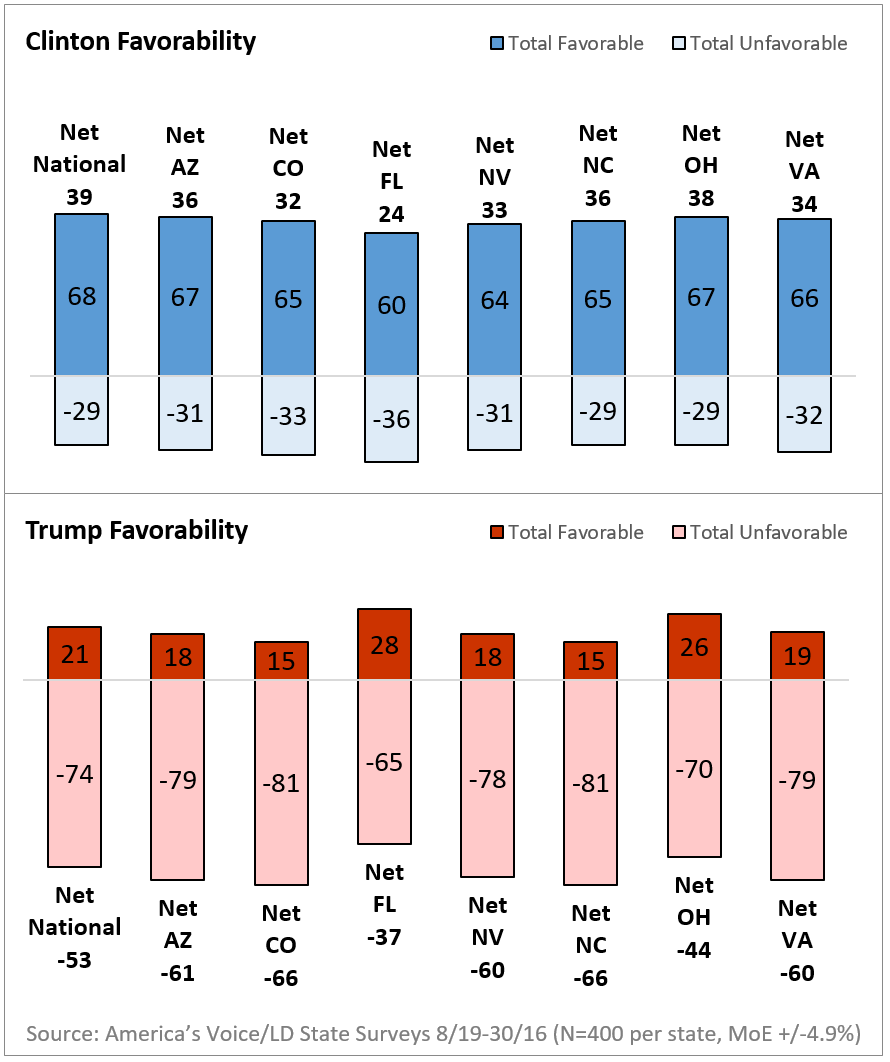
Consistent with the national poll, Donald Trump is viewed very or somewhat unfavorably by 70% or more of Latino voters in every state but Florida, where his combined unfavorable rating is 65%. Only in Florida and Ohio is Trump viewed very or somewhat favorably by more than 20% of Latino voters. In contrast, Democratic presidential nominee Hillary Clinton is perceived either very or somewhat favorably by 60% or more of Latino voters in each of the seven states and only in Florida does her combined unfavorable rating exceed 25%.
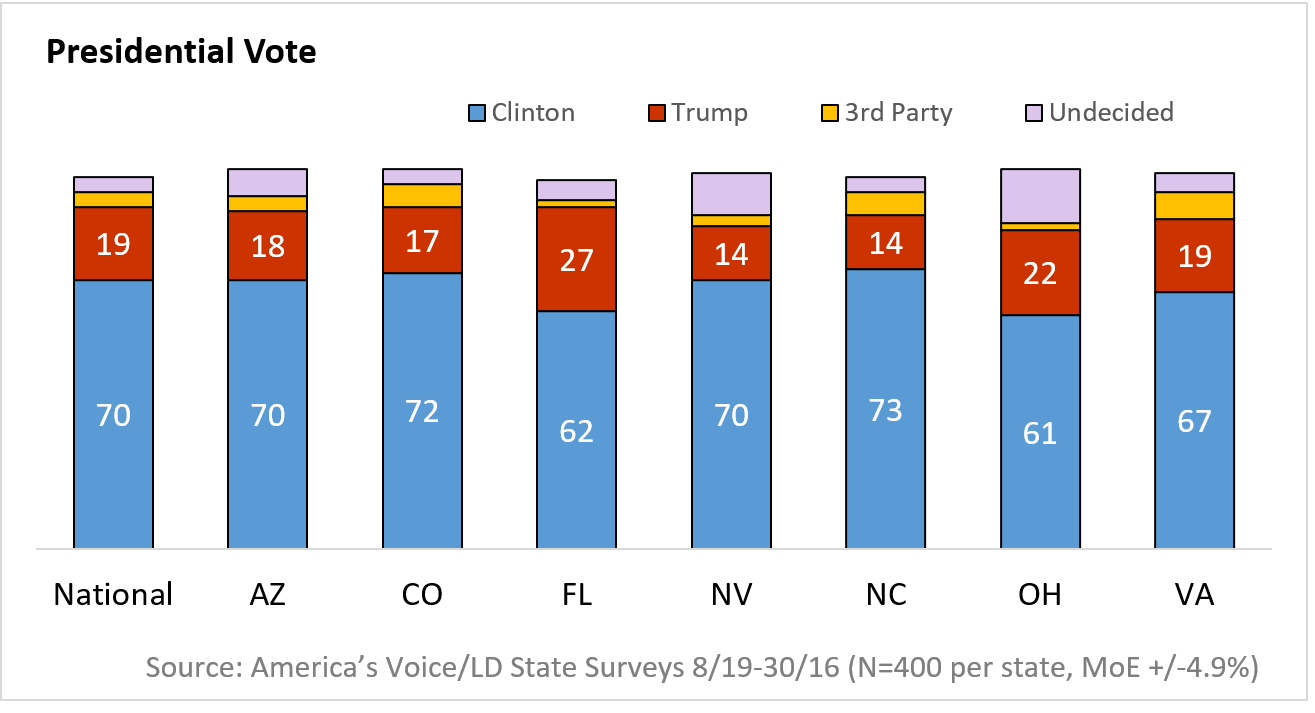
Vote choices in the presidential election closely align with these perceptions as Hillary Clinton leads by large margins in all seven states. She is 50 points ahead or more in North Carolina and in the three Mountain West states. In Florida her lead is 35 points. Besides Cubans (-7) and self-identified Republicans, Clinton leads among every demographic group in the Sunshine State including +62 among those born in Puerto Rico and +59 among those 39 or younger. Trump garners 20% or more of the vote in just two states: Florida (27%) and Ohio (22%). His largest deficit is in North Carolina (-59), followed by Nevada (-56), Colorado (-55), and Arizona (-52%).
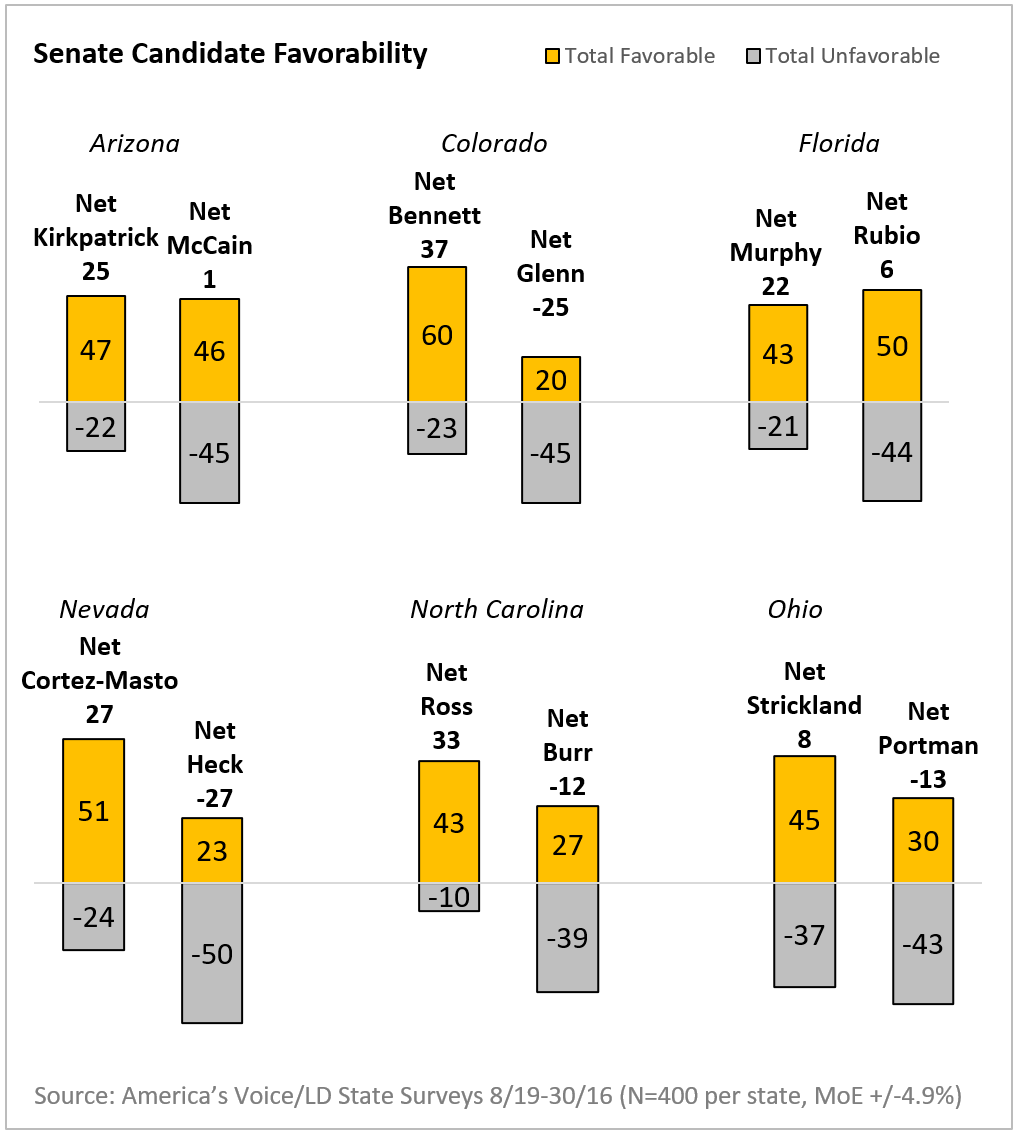
The poll suggests that while the U.S. Senate candidates running in the swing states are less well known than the presidential candidates, the profiles for the Senate candidates are more-or-less similar to those of the presidential candidates. Across the states, Latino voters view the Democratic candidates much more favorably than the Republicans. Indeed, John McCain (+1) and Marco Rubio (+6) are the only Republican Senate candidates viewed more favorably than unfavorably.
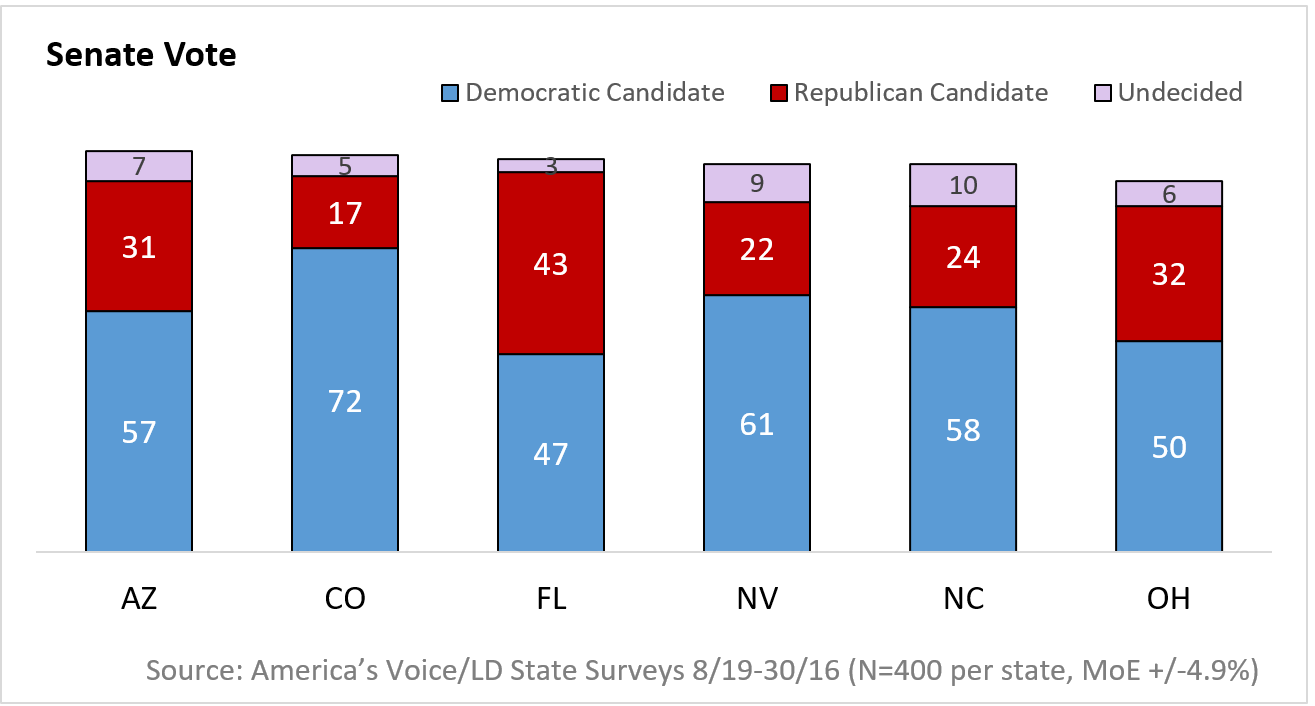
Akin to the presidential vote, vote choice in the Senate races closely parallels the candidate evaluations. The Democrats’ vote advantage ranges from +55 in Colorado to +4 in Florida. In the competitive Nevada Senate race, Democratic Catherine Cortez Masto leads Republican Joe Heck 61% to 22% and in another competitive Mountain West contest, Arizona Democrat Ann Kirkpatrick enjoys a 26 point lead (57% to 31%) over Republican John McCain. Besides Florida, the next closest Senate election is Ohio where incumbent Republican Rob Portman enjoys the support of 32% of Latino voters compared to 50% for his Democratic challenger, former Governor Rob Strickland. Democrats also have substantial margins in the generic House ballot. Only in Florida does the GOP’s share exceed 20% of the House vote.
Yet, in the six states in the poll featuring Senate elections, the Democratic vote margin is smaller and in some instances, substantially smaller, than for the presidency. While some of these differences stem from the fact that there are fewer undecided voters in the presidential election and some respondents indicated that they are not voting for Senate (4% to 6% depending upon the state), the Democratic candidates are running behind Hillary Clinton and the Republicans are doing better than Trump in every state but Colorado. This is most obvious in Florida where Republican Mark Rubio is 16 points ahead of Trump and Democrat Patrick Murphy is running 15 points behind Clinton. In Arizona, Kirkpatrick’s lead over McCain is half of Clinton’s advantage over Trump. There is less slippage in Nevada, where Heck is +8 relative to Trump and Cortez Masto’s vote share is nine points less than Clinton’s.
These data points do, however, raise two important questions: would Senate Republicans be performing better with Latino voters if Trump were not atop the GOP ticket and are Latino voters aware of the differences in the Senate candidates’ positions on immigration; the issue identified as either the first or second most important problem facing the Latino community nationally and in every state?
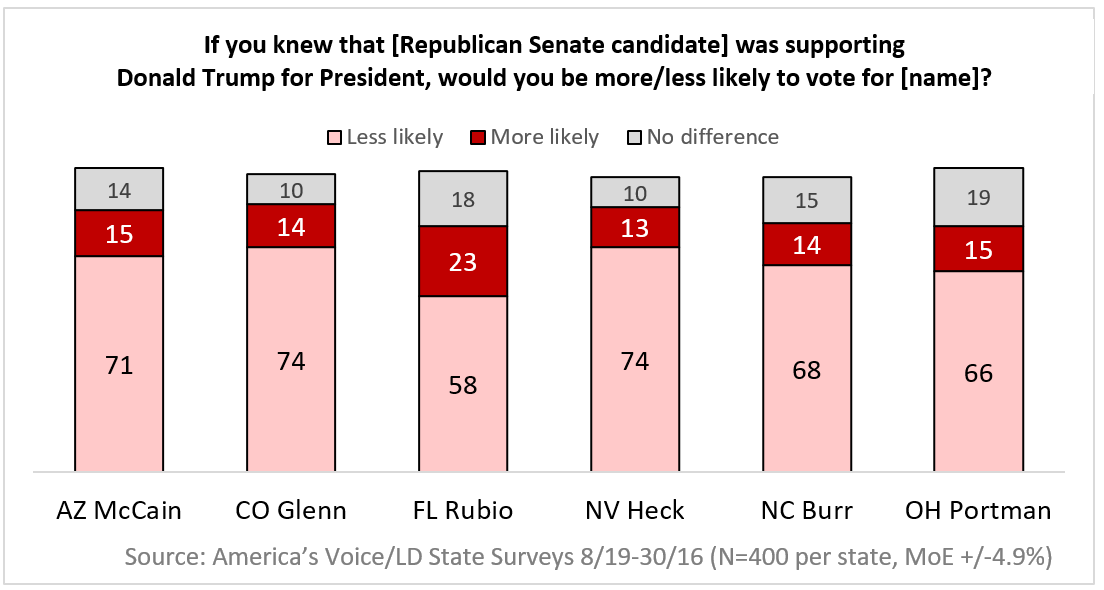
To assess Trump’s potential drag on Republican Senate candidates, respondents were asked if they knew that the Republican Senate candidate was supporting Trump, would they be more or less likely to vote for that candidate. Across all six states, less likely was the overwhelming response. Trump is also perceived as making the Republican Party more hostile to Latinos. This view is shared by a high of 76% in Colorado and close to 70% in all states except for Florida (61% more hostile). The opposite holds for Clinton who is seen as a making the Democratic Party more welcoming to the Latino community.
More generally, Trump and Clinton’s views on immigrants or immigration have the potential to spill over to down ticket races. Respondents in all states indicated that Clinton’s handling of immigration made them substantially more likely to voting for other Democrats, while Trump’s immigration positions had a substantial negative effect on the likelihood of voting for other Republicans.
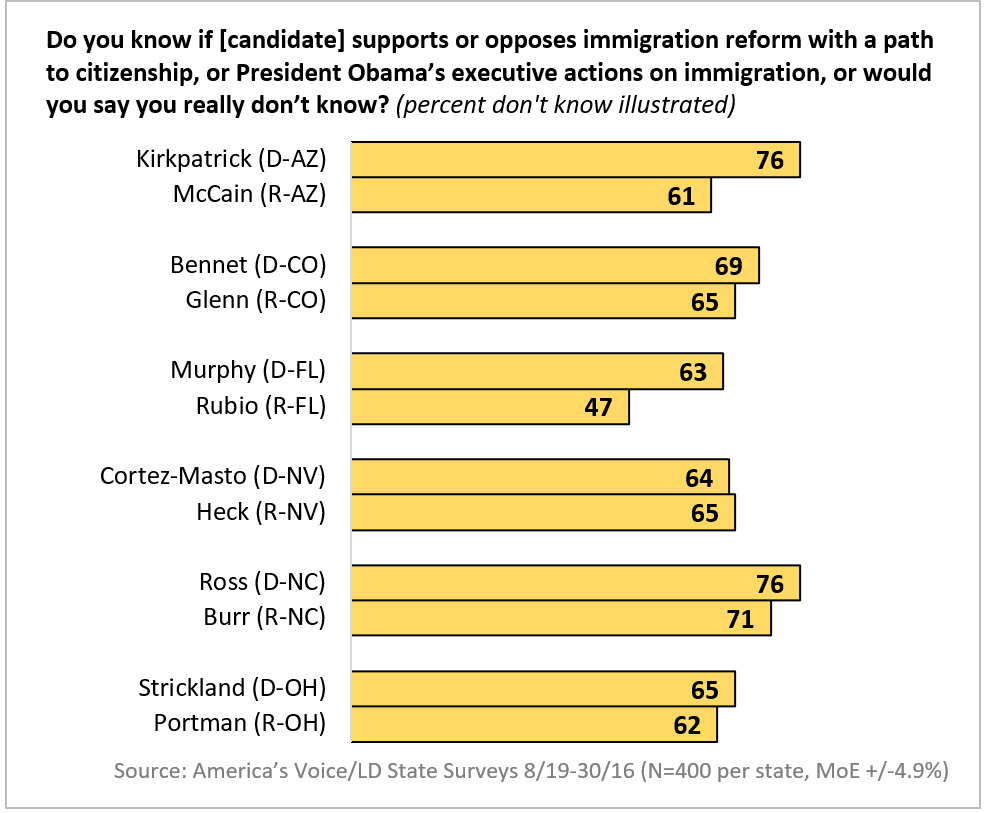
Still, the poll reveals some points of concern for the Democrats. In addition to the vote differences and potential for roll off noted above, the poll assessed knowledge of the Senate candidates’ support or opposition to a pathway to citizenship and President Obama’s executive actions on immigration (DACA and DAPA). In every state, 60% or more of respondents were unaware of the Democratic candidates’ support for these policies and in Arizona and North Carolina, more than three-quarters of respondents did not know that Kirkpatrick and Deborah Ross support these policies.
Similar patterns hold for the Republicans. In every state but Florida, 60% or more of respondents did not know where the Republican candidate stood on these policies and the difference in the share of respondents choosing the supports and the opposes options was five points or less in all six states.
Thus, on the one hand, the results suggest that Trump’s candidacy has created an obvious contrast on immigration for swing state Latino voters and that this difference is resonating at the top of the ticket. This difference also is shaping general perceptions of the parties and has the potential to reverberate elsewhere on the ballot. However, the Democratic Senate candidates have been unable to differentiate themselves from their opponents on the animating issue for many Latinos voters.
As we have written about prior, this same dynamic occurred in the 2014 U.S. Senate race in Colorado. Despite the fact that Republican Cory Gardner and Democratic Make Udall had very different records on immigration, most Latino voters were unaware of these differences and Udall ended up losing by less than 40,000 votes even as Democratic governor John Hickenlooper won reelection. Absent outreach to Latino voters that sharply draws the contrast on immigration there is no guarantee that Latino voters will be aware of these differences.
To this end, the poll asked respondents if they knew that the Democratic Senate candidates supported DACA and DAPA or the Republican candidates opposed these policies how would that impact their Senate vote. Across the six states respondents indicated by substantial margins that knowing where the Senate candidates stand on DACA and DAPA would make them much more or somewhat more likely to vote for the Democratic candidates and somewhat or much less likely to vote for the Republican candidates.
The poll also found that Latino voters are closely following the election. In all seven states, as well as nationally, roughly half of Latino voters or more are talking about the election with friends, family, and co-workers either every day or several times a week and even larger shares of respondents indicated that they are following the election through the media on a daily or weekly basis.
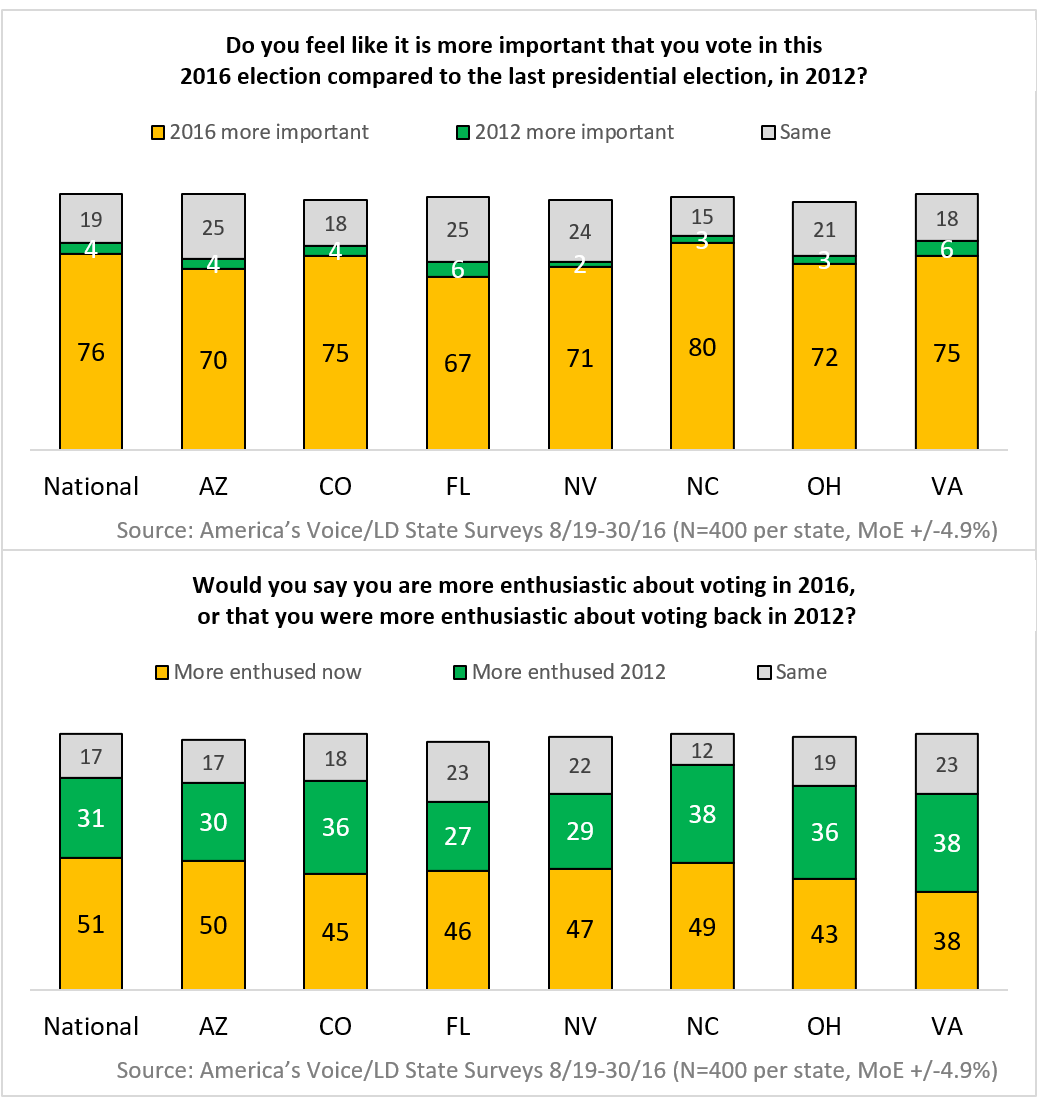
Moreover, as compared to 2012, there is more enthusiasm for voting in 2016 and the notion that voting in 2016 is more important is shared by more than two-thirds of Latino voters in every state. In response to a follow up questions asking why they are more enthusiastic about voting in 2016 or why they think that voting in 2016 is more important, stopping Trump was the top choice in every state followed by supporting Clinton.
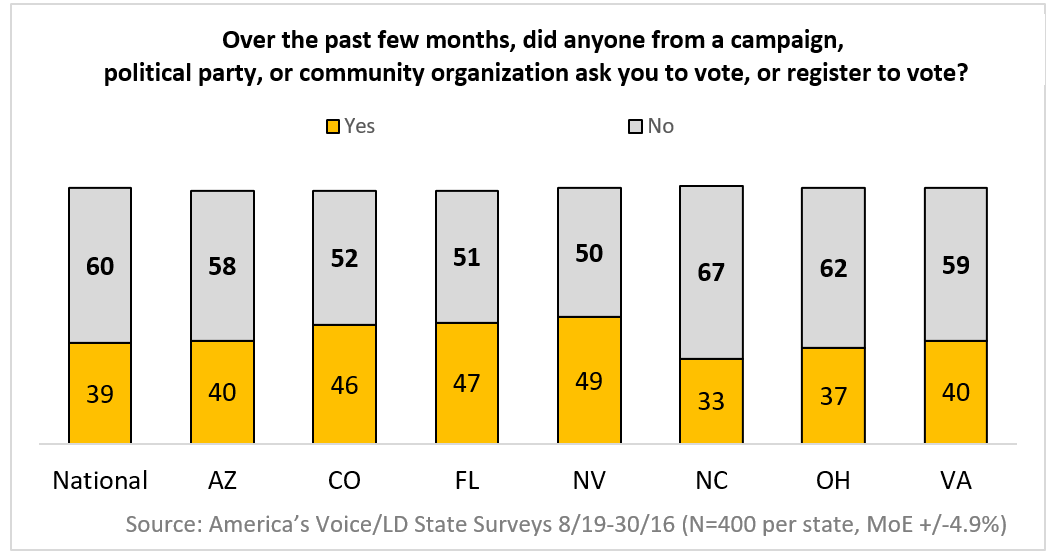
Yet, when respondents were asked if they have been contacted by a campaign, political party, or other organization urging them to register or to vote, nationally 60% responded that they had not been contacted and only in Colorado (46%), Florida (47%), and Nevada (49%) did the share responding yes come close to 50%.
In sum, the 2016 election provides an opportunity for the Democrats to further consolidate their support among Latino voters. Yet, as our national and swing state polls suggest, as compared to the tremendous advantage that Hillary Clinton has over Donald Trump in the presidential election, the Democratic Senate candidates are running behind Clinton and the Republican Senate candidates, except for in Colorado, are out-performing Donald Trump. Given the competitiveness of the Senate races in Arizona, Florida, and Nevada, any decline in support among Latino voters from the top of the ticket may determine if the Democrats regain majority control of the U.S. Senate in November or if that chamber remains under Republican control.
Dr. David Damore is a Senior Analyst at Latino Decisions. He is Professor of Political Science at the University of Nevada, Las Vegas, and a Brookings Mountian West Fellow. Damore has been cited as an expert on Latino voting by the Las Vegas Sun and L.A. Times, and identified by FiveThirtyEight as a lead Nevada expert.


